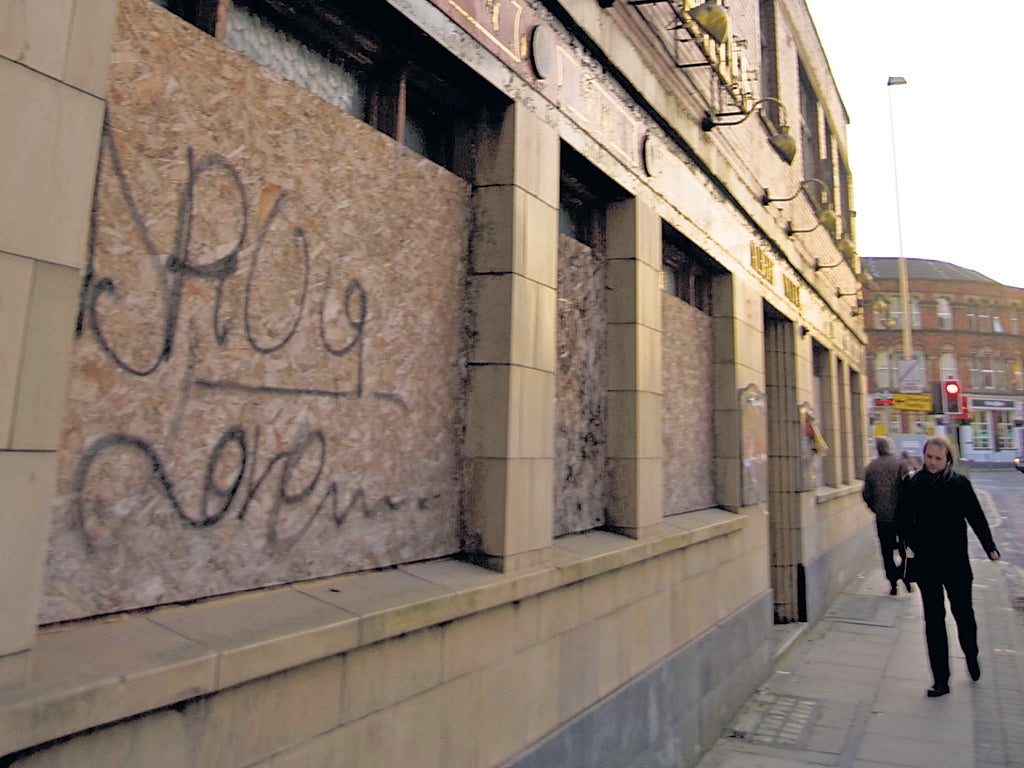Derelict working men's pub could soon reopen its doors – as a home for destitute asylum seekers
This article, by Joshua Carroll, won him this year's Wyn Harness Prize for Young Journalists

A derelict pub once popular with Salford's working men, who gathered at its bar to enjoy a pint of ale and a game of darts, could soon open its doors to destitute asylum seekers.
The Albert Vaults, on Chapel Street, north of Manchester city centre, closed in 2009 and has remained boarded up since, as one of the hundreds of pubs to fall victim to the recession.
Volunteers will gut and refurbish the building, which sits under a railway bridge and opposite a modern apartment block, as a shelter for those who have been through the asylum system and denied permission to stay in the country. The economic downturn, along with the smoking ban and taxes on alcohol, has hit Britain's pubs hard. Figures released last month by the Campaign for Real Ale showed that an average of 16 pubs closed their doors every week in the last six months of 2011.
Sites can often be bought cheaply. "You can pick up pubs in quite good condition for about £100,000 to £150,000," says Dave Smith, who directs the Boaz Trust, the charity working on the project.
The Albert Vaults is one of two potential sites Mr Smith is considering for the shelter, which he hopes to open by the summer.
The asylum seekers the trust helps get no government support, and they are not allowed to work. They are among the thousands of refused asylum seekers who stay and take their chances on the streets, or find refuge with friends who are still in the asylum process, a lifestyle that can last for years.
There are no official figures showing how many failed asylum seekers live in the UK, but the British Red Cross says 11,600 of those they helped in 2009 were destitute.
Philippa McIntyre, who works for the Refugee Council, a national human rights charity, says this figure "only represents a small fraction of destitution among asylum seekers, as many prefer to remain invisible".
In the same year, the National Audit Office estimated that between 155,000 and 283,500 people who had been refused asylum were living in Britain.
Ms McIntyre says about 80 per cent of people who attend the Refugee Council's day centre in Brixton, south London, are destitute. "I've heard stories from clients who sleep in parks or night buses. So people are really in quite a desperate situation. They're living in limbo; they don't have any access to government support and have basically just fallen through the gaps."
Mr Smith says some failed female asylum seekers move in with men in return for sex. Research by Oxfam earlier this year showed some become prostitutes. Others work illegally, often for well below the minimum wage.
The renovated pub would offer long-term, nightly accommodation as well as a space for people to talk to others in the same situation and shelter during the day, a service which is in desperately short supply: "It will address the needs of those wandering around all day because they don't have anywhere to go," Mr Smith says. The Boaz Trust also plans to rent out some of the rooms to people who have earned refugee status, to help the shelter to make an income. The charity already runs a number of night shelters scattered across Manchester, but last winter they were full and had to turn people away.
Many destitute asylum seekers are likely to be from countries mired in conflict or where human rights abuses are widespread. Last year, Eritrea, China, Sri Lanka, Libya and Afghanistan were among the top 10 countries from which asylum seekers arrived in the UK. Ms McIntyre says many are wrongly refused asylum because of a lack of access to legal aid: "The cuts being proposed to legal support are very worrying, it's already difficult for people to get the advice they need."
She says she is pleased to see the Government consulting charities such as hers on improvements to the system, but remains cautious.
"We have over a hundred people a day coming through our doors. That needs to change," Ms McIntyre said.
About The Wyn Harness Prize
The Wyn Harness Prize for Young Journalists was established in November 2008 in memory of The Independent's former assistant editor Wyngate Harness, who died from an inoperable brain tumour in 2007.
Joshua Carroll, 21, was awarded the 2012 Wyn Harness prize for this piece. He is a final-year student of English Literature at the University of Manchester and is a news editor at the university's newspaper, The Mancunion.
Join our commenting forum
Join thought-provoking conversations, follow other Independent readers and see their replies
Comments